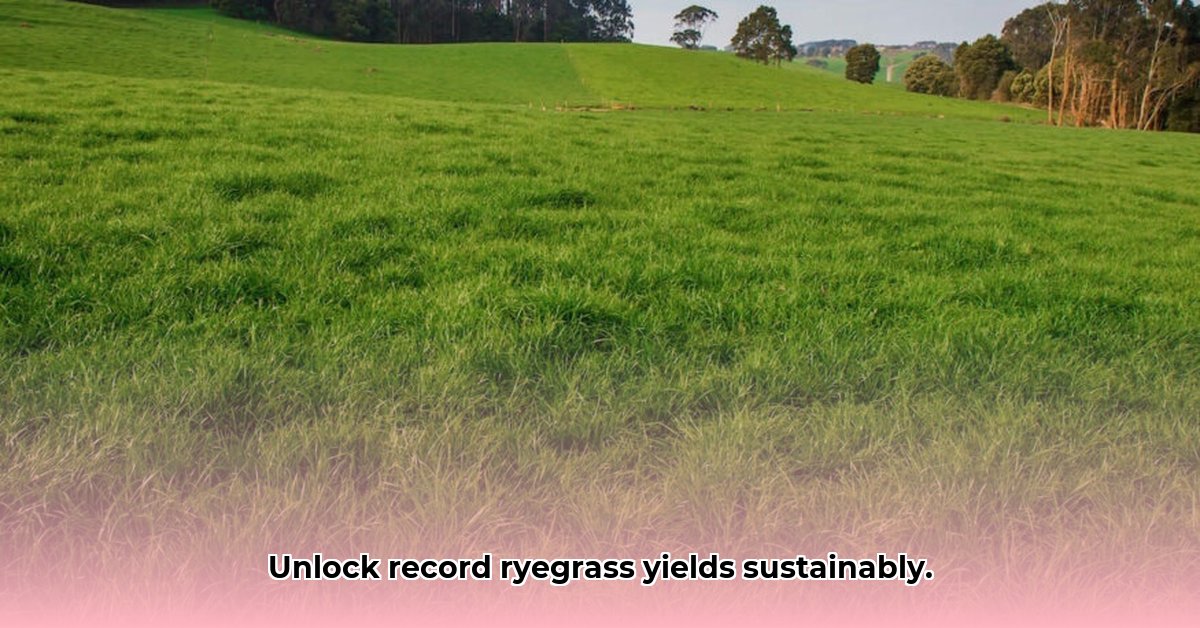
Choosing the right ryegrass seed is crucial for sustainable farming. This guide helps you navigate the decision-making process, comparing popular options like Tractor Supply annual ryegrass and DLF Gulf Arg, while emphasizing the importance of data-driven choices. We'll explore the environmental impact, provide actionable steps for seed selection, and highlight the need for greater data transparency in the industry. For more information on Tractor Supply options, see their website.
Understanding the Challenges of Sustainable Seed Selection
The challenge facing many farmers is balancing cost-effectiveness with long-term environmental sustainability. Readily available, budget-friendly options like Tractor Supply's annual ryegrass often seem appealing. However, a comprehensive understanding of their long-term environmental effects—including water consumption, fertilizer requirements, and carbon footprint—is often lacking. Other options, such as DLF Gulf Arg, may offer superior environmental performance, but verifiable data to support such claims remains limited. This lack of information makes informed decisions incredibly difficult. How can farmers confidently choose seeds that both meet their budgetary needs and support the long-term health of their land?
Comparing Ryegrass Options: Pennington Annual Ryegrass vs. DLF Gulf Arg
A direct comparison between Tractor Supply annual ryegrass and DLF Gulf Arg is currently hampered by a significant data gap. While Tractor Supply's option offers a known, cost-effective short-term solution, its long-term environmental effects aren't fully understood. Similarly, DLF Gulf Arg may offer better environmental performance, but this claim is unsubstantiated by readily accessible, comprehensive research. This lack of data underscores the need for caution against making sweeping generalizations based on limited information. What are the key areas where more research is urgently needed?
Actionable Intelligence: A Step-by-Step Guide to Seed Selection
The absence of comprehensive comparative data necessitates a practical, step-by-step approach to seed selection:
Prioritize Your Goals: Clearly define short-term and long-term objectives. Consider budgetary constraints alongside environmental impact targets. What are your most critical metrics for success?
Evaluate Readily Available Options: If budget is paramount and a rapid solution is required, Tractor Supply annual ryegrass may be a viable starting point. However, this represents a short-term strategy and doesn't address the long-term sustainability considerations.
Explore Sustainable Alternatives: Investigate options like DLF Gulf Arg. However, thorough research into both the environmental impact and long-term economic considerations is vital before large-scale adoption. Are there independent studies validating the environmental benefits of this alternative?
Conduct Small-Scale Trials: Implementing small-scale trials allows for direct comparison of different seed types under your specific conditions. Meticulously track data on yield, water usage, and other relevant metrics. What are the key performance indicators you will monitor?
Advocate for Data Transparency: Encourage seed suppliers to be more transparent about their products' environmental impact. Greater data availability benefits all stakeholders and empowers farmers to make more informed decisions. What initiatives can you undertake to encourage greater transparency within the seed industry?
Risk Assessment and Mitigation Strategies
Seed selection involves inherent risks. The following table outlines potential risks, their probabilities, and recommended mitigation strategies:
| Seed Type | Risk Category | Probability Estimate | Impact Potential | Mitigation Strategies |
|---|---|---|---|---|
| Tractor Supply annual ryegrass | Environmental Impact | Medium | Medium | Conduct small-scale trials; explore long-term sustainable alternatives. |
| DLF Gulf Arg | Data Availability | High | High | Advocate for greater supplier transparency; conduct independent research. |
| Both Types | Monoculture Risk | Medium | High | Diversify crops; consider seed mixtures for enhanced biodiversity. |
The Path Forward: Collaboration and Data-Driven Decision Making
Choosing seeds is a long-term investment impacting land health and farming practices. Sustainable agriculture requires collaboration among researchers, farmers, and seed suppliers to fill significant data gaps. The future of sustainable ryegrass production hinges on data-driven decisions, informed by rigorous research and transparent practices. Let's work together to build a more sustainable future for agriculture.